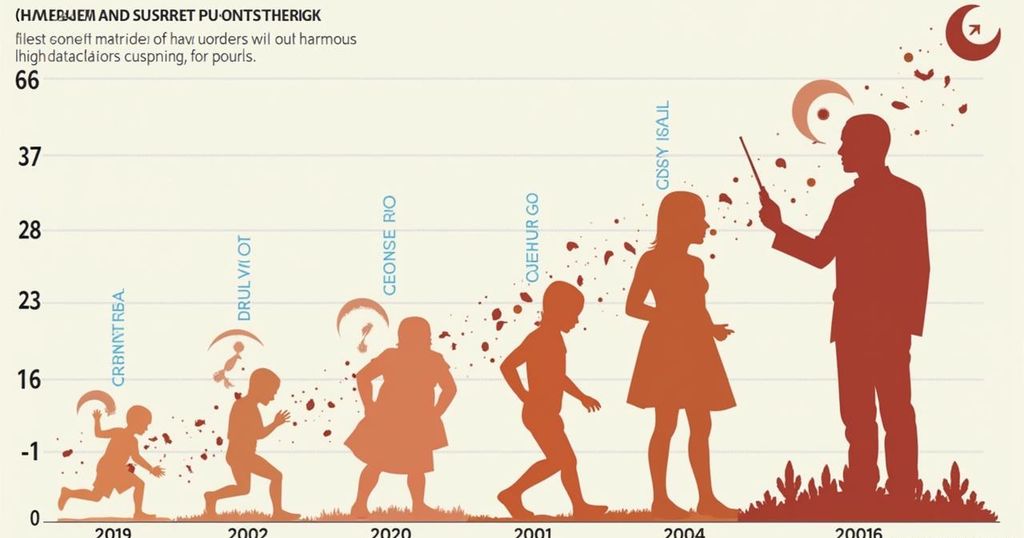Research reveals that hurricanes and tropical storms in the U.S. lead to a significant rise in mortality rates for up to 15 years post-event. The study estimates 7,000 to 11,000 excess deaths per cyclone, resulting in between 3.6 million and 5.2 million total deaths since 1930, far exceeding the official counts. There are significant disparities in mortality risk, particularly affecting Black communities. The findings urge urgent policy considerations for health and disaster management in light of changing climate patterns.
New studies indicate that hurricanes and tropical storms in the United States lead to an observable increase in mortality that persists for nearly 15 years following the events. Traditionally, government statistics account for direct fatalities—averaging 24 deaths per storm—primarily resulting from drowning and trauma during the storm. However, research published on October 2 in the journal Nature unveils a substantially larger, hidden death toll attributable to the aftermath of these storms. Senior study author, Professor Solomon Hsiang from the Stanford Doerr School of Sustainability, stated, “In any given month, people are dying earlier than they would have if the storm hadn’t hit their community.” The study asserts that the cascading effects of a major storm disrupt communities, complicating reconstruction efforts, displacing households, and fracturing social networks, which ultimately have profound implications for public health. The analysis conducted by Hsiang and lead researcher Rachel Young estimates that an average U.S. tropical cyclone indirectly accounts for between 7,000 and 11,000 excess deaths. Cumulatively, it is estimated that hurricanes and tropical storms since 1930 have led to between 3.6 million and 5.2 million deaths in the U.S. This figure significantly surpasses the combined mortality from motor vehicle accidents, infectious diseases, or battle casualties over the same period. The researchers’ findings are based on a rigorous statistical analysis of mortality data associated with 501 tropical cyclones that struck the Atlantic and Gulf coasts between 1930 and 2015. This research builds upon previous studies indicating prolonged economic repercussions from such storms and highlights severe health impacts that are often overlooked. The study further reveals stark disparities in mortality risk, particularly affecting marginalized communities. Black individuals are documented to be three times more likely to die after a hurricane compared to their white counterparts. Dr. Young noted, “These are infants born years after a tropical cyclone, so they couldn’t have even experienced the event themselves in utero.” The analysis indicates that 25% of infant deaths and 15% of deaths among those aged 1 to 44 in the U.S. can be associated with tropical cyclones, signaling long-term health implications as socioeconomic conditions deteriorate in the aftermath of disasters. Responses to such prolonged health risks are essential. Areas that experience fewer hurricanes historically face greater challenges as the long-term risk remains undocumented, leading to a lack of preparedness within the community and health sectors. The Southeastern United States, particularly Florida (13%), North Carolina (11%), South Carolina (9%), and Louisiana (8%), exhibit the highest proportion of deaths attributable to tropical cyclones. Future governmental policies regarding climate change adaptation, coastal resilience, and disaster management must account for the emerging evidence of long-run mortality impacts associated with tropical cyclones. As climate change intensifies, the anticipation of increasingly hazardous storms necessitates proactive measures in public health planning and disaster response strategies. Hsiang’s Global Policy Laboratory at Stanford is currently evaluating the underlying causes of these long-term death trends in relation to hurricanes, integrating a multidisciplinary approach to address the complex socio-economic factors influencing health risks. As Hsiang and Young assert, implementing simple yet effective communication strategies can significantly aid in bridging the gap in healthcare preparedness for vulnerable populations years after receiving disaster recovery funding. Effective foresight and planning could safeguard public health outcomes in future storm-impacted regions.
Hurricanes and tropical storms are severe weather events that have indicated annual increases in intensity and frequency due to climate change. Historically, direct fatalities have been documented during these storms, but this research emphasizes the often-ignored indirect consequences that continue to affect communities for years. Understanding the full scope of hurricanes’ impacts includes recognizing the broken social infrastructure, economic instability, and health-related challenges that persist long after the storms have passed. As these storms are projected to become more frequent with climate change, recognizing their long-term health ramifications becomes critical for public health and safety policies.
The research highlights the necessity for comprehensive understanding and preparedness regarding the long-lasting impacts of hurricanes on mortality. The staggering number of estimated excess deaths underscores the need to consider indirect effects when evaluating the true cost of tropical cyclones. The implications for public health, particularly among vulnerable populations, call for immediate attention from policy makers to mitigate risks and improve resilience in the face of climate change.
Original Source: news.stanford.edu






